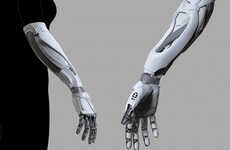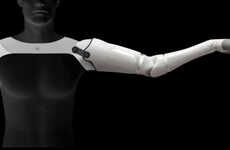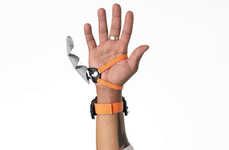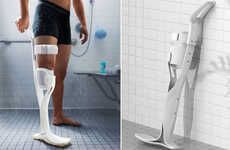
The 'Open Hand Project' Makes Affordable Prosthetic Hands
Christopher Magsambol — August 26, 2015 — Tech
References: openhandproject.org & gizmodo
The 'Open Hand Project' is attempting to create faster, cheaper and more efficient ways to provide accessible prosthetic hands to those needing them.
Engineer Joel Gibbard developed a prototype called 'Dextrus' for under 1,500 dollars, which costs far less than other prosthetics that range up to tens of thousands of dollars. Gibbard reinvented the traditional way prosthetics are made through a series of alterations.
The first step in creating accessible prosthetic hands would be 3D printing the hand in durable plastic in under 40 hours. Those who receive the prosthetic control the new hand with EMG sensors, which read the electrical potential of a user's muscles. Stainless steel is used to create tendons, which enable plastic bones to pinch and grip. All of the technological capabilities are powered by lithium batteries.
The project recently won the Britain's Dyson Award which will now help kick-start the enterprise.
Engineer Joel Gibbard developed a prototype called 'Dextrus' for under 1,500 dollars, which costs far less than other prosthetics that range up to tens of thousands of dollars. Gibbard reinvented the traditional way prosthetics are made through a series of alterations.
The first step in creating accessible prosthetic hands would be 3D printing the hand in durable plastic in under 40 hours. Those who receive the prosthetic control the new hand with EMG sensors, which read the electrical potential of a user's muscles. Stainless steel is used to create tendons, which enable plastic bones to pinch and grip. All of the technological capabilities are powered by lithium batteries.
The project recently won the Britain's Dyson Award which will now help kick-start the enterprise.
Trend Themes
1. Accessible Prosthetics - The use of 3D printing and EMG sensors to create affordable, easily accessible prosthetic limbs
2. Innovative Prosthetic Manufacturing - Revolutionizing the way prosthetics are made through the use of durable plastic, stainless steel tendons, and lithium batteries
3. Affordable Healthcare Technology - Providing life-changing healthcare technology at a fraction of the cost of traditional prosthetics
Industry Implications
1. Healthcare - The healthcare industry can benefit from the cost-effective and innovative technology to provide affordable and accessible prosthetic care
2. 3D Printing - The 3D printing industry can be disrupted by providing affordable and customizable prosthetics at a faster rate and lower cost
3. Engineering - The engineering industry can collaborate and contribute to improve and advance the manufacturing of prosthetics through innovative solutions
0.6
Score
Popularity
Activity
Freshness















